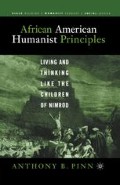Abstract
I suggest we begin by recognizing that enthusiasm for religiously based solutions to sociopolitical dilemmas facing the United States is not a recent development. It’ s historical roots run much deeper than that. Over the course of the nation’ s life, from the Great Awakenings of the 1700s and 1800s to the present, segments of the aggressively religious have interpreted their historical situation by means of a theology of disconnect. That is to say, they viewed the problems faced by the United States, problems that threatened, from their perspective, the viability of the nation, as stemming from a failure to maintain commitment to the teachings of Christ. Let us take the period of the Civil War as an example. Concern with the spiritual condition of the United States dominated the thought of many Methodists. Some of the more aggressive holders of this mindset took it upon themselves to spark a holiness campaign to enliven a national devotion to God, thereby recapturing the revival fervor felt early in the nation’ s life. This push toward greater religious commitment and devotion was made in the south as well as the north. In places like New Jersey, camp meetings began to take place, giving shape to a more general call for holiness, recorded in the New Testament, and articulated through a discourse of spiritual authority tied to historical transformation. The reach of holiness and other evangelical perspectives was rather broad if one keeps in mind, for example, that the Democratic party ran William Jennings Bryan, an evangelical, as its candidate for the presidency in 1896.2
First presented at All Souls Unitarian Universalist Church, Kansas City, Missouri as “When This Life On Earth Is Just Practice: Thoughts on the Christian Right’s Motivations and Preoccupations.”
Access this chapter
Tax calculation will be finalised at checkout
Purchases are for personal use only
Preview
Unable to display preview. Download preview PDF.
Notes
George M. Marsden, Understanding Fundamentalism and Evangelicalism (Grand Rapids, MI: William B. Eerdmans Publishing Company, 1991), 91.
Walter H. Capps, The New Religious Right: Piety, Patriotism, and Politics (Columbia: University of South Carolina, 1990), 6.
Steve Bruce, “The Inevitable Failure of the New Christian Right,” in Steve Bruce et al., eds., The Rapture of Politics: The Christian Right as the United States Approaches the Year 2000 (New Brunswick, NJ: Transaction Publishers, 1995), 10–11.
Walter H. Capps, The New Religious Right: Piety, Patriotism, and Politics (Columbia: University of South Carolina, 1990), 186.
Jerry Falwell, Listen, America! (Garden City, NY: Doubleday and Company, 1980).
Cited in Michael Lienesch, Redeeming America: Piety & Politics in the New Christian Right (Chapel Hill: The University of North Carolina Press, 1993), 224.
Susan Friend Harding, The Book of Jerry Falwell: Fundamentalist Language and Politics (Princeton: Princeton University Press, 2000), 230.
George M. Marsden, Understanding Fundamentalism and Evangelicalism (Grand Rapids, MI: William B. Eerdmans Publishing Company, 1991), 112.
Cited in Michael Lienesch, Redeeming America: Piety & Politics in the New Christian Right (Chapel Hill: The University of North Carolina Press, 1993), 228.
John Bunyan, The Pilgrim’s Progress (New York: Penguin Books [1965] 1987), 13.
St. Augustine, City of God, Book XXII, an abridged, Version from the translation by Gerald G. Walsh, Demetrius B. Zema, Grace Monahan, and Daniel J. Honan (Garden City, NY: Image Books, 1958), 544–45.
Richard Wright, Black Boy (New York: Harper & Row, Publishers, 1966), 281.
Copyright information
© 2004 Anthony B. Pinn
About this chapter
Cite this chapter
Pinn, A.B. (2004). The Christian Right and Soteriology: A Humanist Alternative. In: African American Humanist Principles. Black Religion/Womanist Thought/Social Justice. Palgrave Macmillan, New York. https://doi.org/10.1007/978-1-349-73324-8_5
Download citation
DOI: https://doi.org/10.1007/978-1-349-73324-8_5
Publisher Name: Palgrave Macmillan, New York
Print ISBN: 978-1-349-73326-2
Online ISBN: 978-1-349-73324-8
eBook Packages: Palgrave Religion & Philosophy CollectionPhilosophy and Religion (R0)

